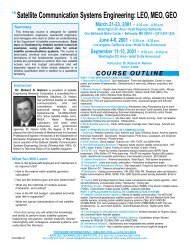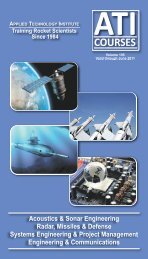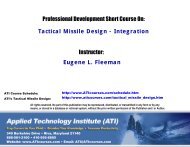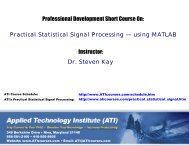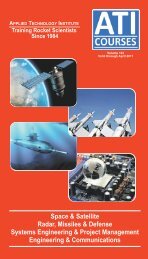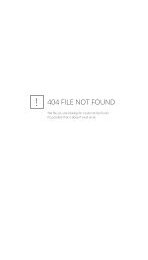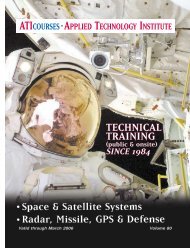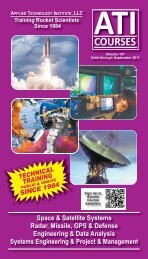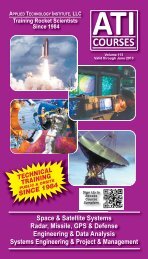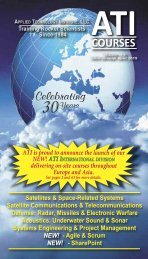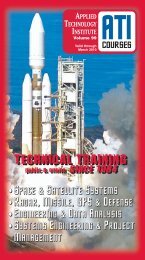Acoustics & Sonar Engineering Radar, Missiles & Defense Systems ...
Acoustics & Sonar Engineering Radar, Missiles & Defense Systems ...
Acoustics & Sonar Engineering Radar, Missiles & Defense Systems ...
You also want an ePaper? Increase the reach of your titles
YUMPU automatically turns print PDFs into web optimized ePapers that Google loves.
Practical Statistical Signal Processing Using MATLAB<br />
with <strong>Radar</strong>, <strong>Sonar</strong>, Communications, Speech & Imaging Applications<br />
Summary<br />
This four-day course covers signal processing<br />
systems for radar, sonar, communications, speech,<br />
imaging and other applications based on state-of-theart<br />
computer algorithms. These algorithms include<br />
important tasks such as data simulation, parameter<br />
estimation, filtering, interpolation, detection, spectral<br />
analysis, beamforming, classification, and tracking.<br />
Until now these algorithms could only be learned by<br />
reading the latest technical journals. This course will<br />
take the mystery out of these designs by introducing<br />
the algorithms with a minimum of mathematics and<br />
illustrating the key ideas via numerous examples using<br />
MATLAB.<br />
Designed for engineers, scientists, and other<br />
professionals who wish to study the practice of<br />
statistical signal processing without the headaches,<br />
this course will make extensive use of hands-on<br />
MATLAB implementations and demonstrations.<br />
Attendees will receive a suite of software source code<br />
and are encouraged to bring their own laptops to follow<br />
along with the demonstrations.<br />
Each participant will receive two books<br />
Fundamentals of Statistical Signal Processing: Vol. I<br />
and Vol. 2 by instructor Dr. Kay. A complete set of notes<br />
and a suite of MATLAB m-files will be distributed in<br />
source format for direct use or modification by the user.<br />
Instructor<br />
Dr. Steven Kay is a Professor of Electrical<br />
<strong>Engineering</strong> at the University of<br />
Rhode Island and the President of<br />
Signal Processing <strong>Systems</strong>, a<br />
consulting firm to industry and the<br />
government. He has over 25 years<br />
of research and development<br />
experience in designing optimal<br />
statistical signal processing algorithms for radar,<br />
sonar, speech, image, communications, vibration,<br />
and financial data analysis. Much of his work has<br />
been published in over 100 technical papers and<br />
the three textbooks, Modern Spectral Estimation:<br />
Theory and Application, Fundamentals of<br />
Statistical Signal Processing: Estimation Theory,<br />
and Fundamentals of Statistical Signal<br />
Processing: Detection Theory. Dr. Kay is a Fellow<br />
of the IEEE.<br />
January 9-12, 2012<br />
Laurel, Maryland<br />
$2095 (8:30am - 4:00pm)<br />
"Register 3 or More & Receive $100 00 each<br />
Off The Course Tuition."<br />
Course Outline<br />
1. MATLAB Basics. M-files, logical flow, graphing,<br />
debugging, special characters, array manipulation,<br />
vectorizing computations, useful toolboxes.<br />
2. Computer Data Generation. Signals, Gaussian<br />
noise, nonGaussian noise, colored and white noise,<br />
AR/ARMA time series, real vs. complex data, linear<br />
models, complex envelopes and demodulation.<br />
3. Parameter Estimation. Maximum likelihood, best<br />
linear unbiased, linear and nonlinear least squares,<br />
recursive and sequential least squares, minimum mean<br />
square error, maximum a posteriori, general linear model,<br />
performance evaluation via Taylor series and computer<br />
simulation methods.<br />
4. Filtering/Interpolation/Extrapolation. Wiener,<br />
linear Kalman approaches, time series methods.<br />
5. Detection. Matched filters, generalized matched<br />
filters, estimator-correlators, energy detectors, detection<br />
of abrupt changes, min probability of error receivers,<br />
communication receivers, nonGaussian approaches,<br />
likelihood and generalized likelihood detectors, receiver<br />
operating characteristics, CFAR receivers, performance<br />
evaluation by computer simulation.<br />
6. Spectral Analysis. Periodogram, Blackman-Tukey,<br />
autoregressive and other high resolution methods,<br />
eigenanalysis methods for sinusoids in noise.<br />
7. Array Processing. Beamforming, narrowband vs.<br />
wideband considerations, space-time processing,<br />
interference suppression.<br />
8. Signal Processing <strong>Systems</strong>. Image processing,<br />
active sonar receiver, passive sonar receiver, adaptive<br />
noise canceler, time difference of arrival localization,<br />
channel identification and tracking, adaptive<br />
beamforming, data analysis.<br />
9. Case Studies. Fault detection in bearings, acoustic<br />
imaging, active sonar detection, passive sonar detection,<br />
infrared surveillance, radar Doppler estimation, speaker<br />
separation, stock market data analysis.<br />
What You Will Learn<br />
• To translate system requirements into algorithms that<br />
work.<br />
• To simulate and assess performance of key<br />
algorithms.<br />
• To tradeoff algorithm performance for computational<br />
complexity.<br />
• The limitations to signal processing performance.<br />
• To recognize and avoid common pitfalls and traps in<br />
algorithmic development.<br />
• To generalize and solve practical problems using the<br />
provided suite of MATLAB code.<br />
58 – Vol. 109 Register online at www.ATIcourses.com or call ATI at 888.501.2100 or 410.956.8805



